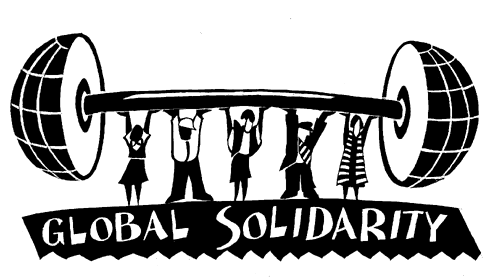Happiness means being whole and being part of. It is music—even a single note is not without context—and it is a paradox. We in the west conflate the idea of being whole with being independent—usually through wealth accumulation. This makes it very difficult to be part of anything and, thus very difficult to be happy. My friend Bill Jordan, the author of the wonderful book, The Sunflower Forest,[1] likes to recount Reagan’s deeply troubling vision for America: the commitment to the idea that what America is about is creating a society in which the pursuit and achievement of wealth is paramount. For Bill this meant a watering down of rich relationships and a thinning of the social fabric. “A relationship mediated abstractly [with cash]”, he tells me, “replaces the emotionally rich, though challenging, relationships” of community. After all, once you pay someone, you have no further obligation to them. The relationship becomes, says Bill, “terminal”.
The word “finance”, from which most wealth is derived nowadays, comes from Middle French meaning “ending, settlement of a debt (13c)” nothing further required. It is “final”. When brought into English in the mid 15th Century it meant “ransom.” “Fin” comes from Latin, meaning “end”, of course, and this derives from the Greek telos, which is the intentional end, the aim towards which one deploys his means in life. [2] The words we use tell us a lot about ourselves, and the world we live in—upon reflection. It’s not too much to say that bankers’ telos is to accumulate wealth by holding us all for ransom. Think also of the now ubiquitous avoidance of taxes by wealthy individuals and corporations. These are simply financial machinations to increase wealth by minimizing any obligation to the society they live in—the very one that enabled their wealth in the first place. It is an intentional—and unconscionable—thinning of the social fabric.
And so Bill tells the story of Thoreau borrowing an ax from his neighbor and returning it well cared for, “…I returned it sharper than I received it,” said Thoreau. [3] And so that relationship continued. In fact, because the ax was returned a better tool, progress had been achieved. “This is a very interesting passage from Walden,” says Bill, “because Thoreau thought his borrowing of the ax was a generous act on his part, giving his neighbor a chance to participate in the adventure at Walden Pond.” That may sound strange but if you think about it a bit, you’ll see that it’s critically important. Thoreau wanted to be whole and he wanted to be part of—this was his telos. He achieved that to a large degree by borrowing an ax from his neighbor. He didn’t buy one himself.
To be whole and to be part-of, that’s my telos. Maybe it’s yours too.
There is something intrinsically problematic with wealth—you know it, you can feel it even as you desire it. Wealth debilitates people, sets them apart, impedes their vision and fills them with foolish and often very dangerous ideas. Few can survive its effects. Wealth promotes crippling independence and hubris enough to cripple others. What about philanthropy by the wealthy—isn't that to be praised and appreciated? True philanthropy exists, but probably not in the manner you might think. Most often it’s a soft and not-so-soft tyranny. Bill Gates, et al, are no heroes of mine. In fact most philanthropists are the new adjunct architects of our world—which, I think, we can all agree, is a mess.
In a recent NYT Op-ed piece Warren Buffet’s son is quite damning of the whole thing, arguing that many wealthy folks throw a pittance towards solving the very problems they caused. He even calls philanthropy, “The Charitable-Industrial Complex”. He’s exactly right, and it is one of the ironies of our present day that broad policy discussion and debate have been largely replaced by the egoistic faux-generosity of these charlatan nouveau-do-gooders who think they know what’s best for everyone. What they are actually doing, of course, is perpetuating the system that has rewarded them—a system that has created massive inequality, widespread anxiety and dis-ease and brought us to the point of ecological collapse. Think about this: if they’ve made it to the top in a fucked-up world, isn’t it likely that they’re one of the world’s most fucked up people? Much of today’s philanthropy is yet another, and deeply pernicious, form of privatization, further strengthening the plutocracy.
Peter Buffett thinks so and more. He questions ideas of progress, fundamentally, and flatly says that “we need to try out concepts that shatter current structures and systems that have turned much of the world into one vast market.” This is the work of the Tecumseh Project, and if you’re a reader, it’s your work too.
The Tecumseh Project calls for the peaceful overthrow of these malignant interests by enabling people, us, to see the wisdom in dropping out of their system, repudiating its underlying values thereby strengthening ourselves, our neighbors and our planet.
We can, and must, tell ourselves and each other a better, more human story. A new human narrative of authentic concert.
Peace,
EJT
[1] Jordan, William R. III, PhD. The Sunflower Forest: Ecological Restoration and the New Communion with Nature. University of California Press, 2003. About which Michael Pollan says, “Ecological restoration is one of today’s most constructive, hopeful, and provocative environmental movements and William Jordan III is its leading visionary.”
[2] http://www.etymonline.com/index.php?term=finance&allowed_in_frame=0 accessed January 14, 2013
[3] Thoreau, Henry David. Walden Pond, Modern Library Edition, page 36 (Original publication 1854)



 RSS Feed
RSS Feed